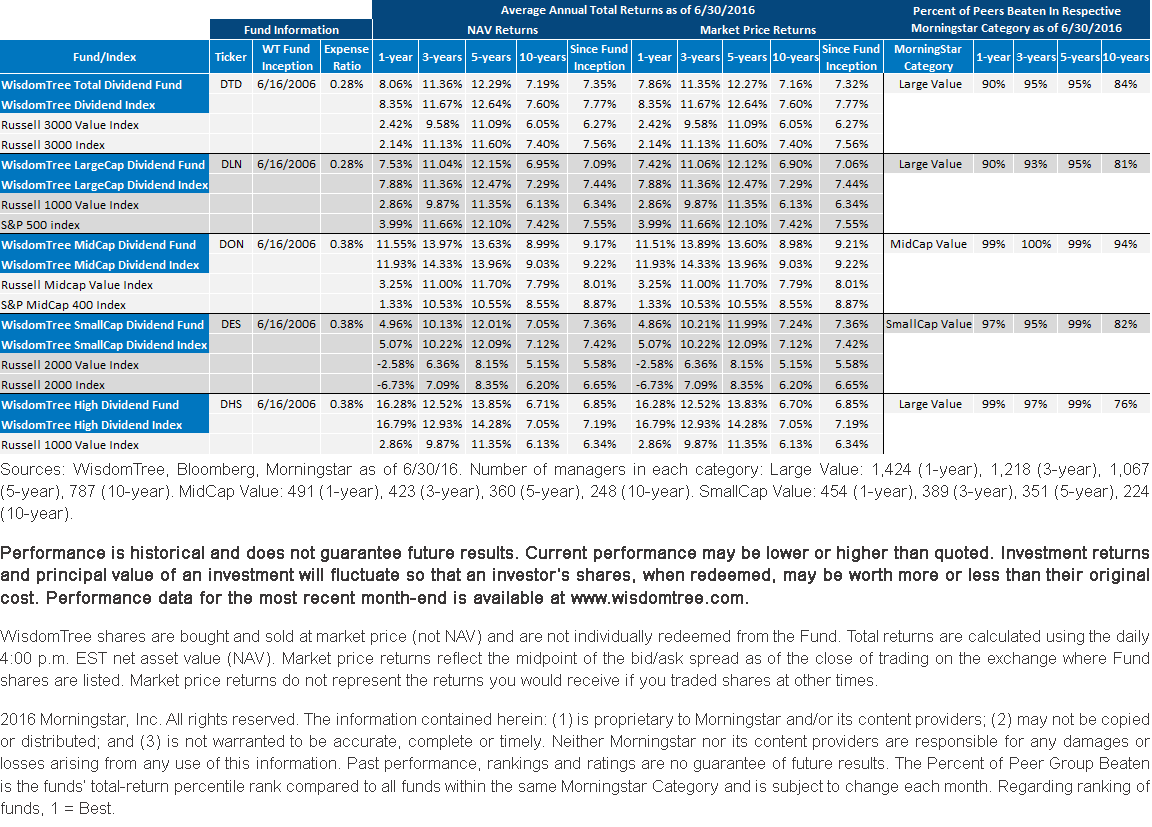How the Top 1% Occupied Wall Street


 Such impressive performance raises the question, “How is it possible for an index fund to beat 99% of its peer group over a five-year time frame?”
First, investors should not assume that index funds are “average” just because they seek to measure the average return of an asset class. After fees, expenses and transaction costs, most actively managed mutual funds fail to outperform traditional cap-weighted equity benchmarks.1 The S&P MidCap 400 Index, for example, beat 89% of mid-cap value managers over the 10 years ending June 30, 2016, according to Morningstar. Second, although cap-weighted indexes may be difficult for most active managers to surpass, fundamentally weighted indexes are developing a history of having much greater success. Put another way, if you wish to beat the indexes over time, you may simply need to work with a better index—not a better stock picker.
WisdomTree believes that one potential way to beat the market over time is simply to own the dividend-paying portion of the market and weight companies based on the dividends they pay. In June 2006, WisdomTree unveiled the industry’s first family of dividend-weighted ETFs covering most major equity markets around the world. The launch reflected WisdomTree’s original vision that weighting equity markets by income, rather than by market capitalization, held out the potential to generate higher returns, often with lower volatility, than traditional cap-weighted benchmarks. WisdomTree believed its fundamentally weighted approach could serve as a viable alternative to traditional cap-weighted indexes around the world. For the first time, investors could own the large-cap, mid-cap, or small-cap portion of domestic or international equity markets, rebalanced annually and weighted by the dividends companies pay, rather than by their market value.
By selecting companies based on their market capitalization, WisdomTree has created broad Indexes in each of the major size segments of the market, thus creating immense investment capacity for index funds that track them. This is important for investors interested in controlling for risks associated with the size of a company based on market capitalization. It also means that ETFs based on WisdomTree’s Indexes can be used as tools in broader asset allocations, as they typically have exhibited high correlations to established cap-weighted benchmarks.
After 10 years, we can see the real-time results of this approach. For example, DON was able to beat the S&P MidCap 400 Index and the Russell Midcap Value Index over the last year, three years, five years and ten years, simply by owning the mid-cap dividend-paying portion of the U.S. stock market and weighting those companies in proportion to the dividends they pay. Similarly, DES beat the Russell 2000 Index and the Russell 2000 Value Index over those same periods simply by owning dividend-paying small caps, dividend weighted.
Conclusion
When one examines which funds occupy the top 1% of Wall Street’s league tables, the conclusion may seem counterintuitive. For the past five years, index funds, specifically ETFs that track WisdomTree’s proprietary stock Indexes, have soared to the top of that list. This reflects the power of indexing, the power of rebalancing portfolios annually based on relative value and the enduring power of dividends.
1Source: https://us.spindices.com/search/?ContentType=SPIVA
Such impressive performance raises the question, “How is it possible for an index fund to beat 99% of its peer group over a five-year time frame?”
First, investors should not assume that index funds are “average” just because they seek to measure the average return of an asset class. After fees, expenses and transaction costs, most actively managed mutual funds fail to outperform traditional cap-weighted equity benchmarks.1 The S&P MidCap 400 Index, for example, beat 89% of mid-cap value managers over the 10 years ending June 30, 2016, according to Morningstar. Second, although cap-weighted indexes may be difficult for most active managers to surpass, fundamentally weighted indexes are developing a history of having much greater success. Put another way, if you wish to beat the indexes over time, you may simply need to work with a better index—not a better stock picker.
WisdomTree believes that one potential way to beat the market over time is simply to own the dividend-paying portion of the market and weight companies based on the dividends they pay. In June 2006, WisdomTree unveiled the industry’s first family of dividend-weighted ETFs covering most major equity markets around the world. The launch reflected WisdomTree’s original vision that weighting equity markets by income, rather than by market capitalization, held out the potential to generate higher returns, often with lower volatility, than traditional cap-weighted benchmarks. WisdomTree believed its fundamentally weighted approach could serve as a viable alternative to traditional cap-weighted indexes around the world. For the first time, investors could own the large-cap, mid-cap, or small-cap portion of domestic or international equity markets, rebalanced annually and weighted by the dividends companies pay, rather than by their market value.
By selecting companies based on their market capitalization, WisdomTree has created broad Indexes in each of the major size segments of the market, thus creating immense investment capacity for index funds that track them. This is important for investors interested in controlling for risks associated with the size of a company based on market capitalization. It also means that ETFs based on WisdomTree’s Indexes can be used as tools in broader asset allocations, as they typically have exhibited high correlations to established cap-weighted benchmarks.
After 10 years, we can see the real-time results of this approach. For example, DON was able to beat the S&P MidCap 400 Index and the Russell Midcap Value Index over the last year, three years, five years and ten years, simply by owning the mid-cap dividend-paying portion of the U.S. stock market and weighting those companies in proportion to the dividends they pay. Similarly, DES beat the Russell 2000 Index and the Russell 2000 Value Index over those same periods simply by owning dividend-paying small caps, dividend weighted.
Conclusion
When one examines which funds occupy the top 1% of Wall Street’s league tables, the conclusion may seem counterintuitive. For the past five years, index funds, specifically ETFs that track WisdomTree’s proprietary stock Indexes, have soared to the top of that list. This reflects the power of indexing, the power of rebalancing portfolios annually based on relative value and the enduring power of dividends.
1Source: https://us.spindices.com/search/?ContentType=SPIVAImportant Risks Related to this Article
There are risks associated with investing, including possible loss of principal. Funds focusing their investments on certain sectors and/or smaller companies increase their vulnerability to any single economic or regulatory development. This may result in greater share price volatility. Dividends are not guaranteed, and a company currently paying dividends may cease paying dividends at any time. Please read each Fund’s prospectus for specific details regarding each Fund’s risk profile.


